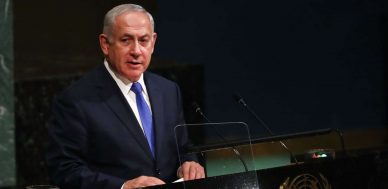Investigation into Netanyahu Corruption Allegations Might Force an Election in 2018
Israeli Prime Minister Benjamin Netanyahu, aka Bibi, has found an ally in President Donald Trump. Many consider their right-wing fanaticism as one of the elements that has facilitated their mutual understanding. Both have an idea of dialogue or negotiation that, more than seeking common ground, revolves around the mere contours of the argument they have imposed.
Trump unilaterally decided to move straight to what should have been the last point of a Palestinian-Israeli peace “deal,” moving the U.S. embassy to Jerusalem, de-facto accepting Jerusalem as the Israeli capital. Netanyahu has gained considerable political capital in Israel thanks to Trump.
Trump has delivered a major win to the most conservative elements of Netanyahu’s government, such as Defense Minister Avigdor Lieberman and the settler movement. By all accounts then, a parliamentary election in 2018 would likely serve Netanyahu well. He could get more support, further consolidating his own Likud Party’s strength.
The Israeli head of government had been facing increasing allegations of corruption. A special police unit, known as Lahav 433, has been conducting two separate graft investigations, which have the Israeli PM in their sights. Had Trump not taken the controversial step, however, Netanyahu would have gone into 2018 facing a far less certain political future. But, perhaps, even Trump’s solid support and the Jerusalem capital declaration won’t be able to save Netanyahu’s political hide.
The Jerusalem effect may have shorter political legs than Netanyahu was expecting. Within days of Trump’s declaration, thousands of protesters marched in Tel Aviv, demanding Netanyahu resign. Now, the investigations are heading to a close and Bibi must resort to legal subterfuges, which critics say are designed to interfere with the police’s ability to indict Netanyahu in the possibility—or probability—they find incriminating evidence. (Source: “Netanyahu Allies Try to Curb Police as Corruption Probes Wrap Up,” Bloomberg, December 28, 2017.)
The prime minister’s supporters are adamant that he won’t resign. But this is where the Jerusalem decision could come to his aid. Netanyahu’s political strength has always relied on the idea of security. The timing of the Jerusalem decision seems suspect just weeks before the end of the investigation. But Netanyahu knew all too well that the very move would have mobilized the Palestinians in protest.
So far, Israeli forces have arrested some 600 Palestinians in the wake of Trump’s Jerusalem announcement. Most United Nations members have rejected the declaration; only nine countries including Israel and the United States approved. This will encourage the protests further. Moreover, several children and teenagers are involved, including a 16-year old girl, Ahed Tamimi, who appears to be the new face of the Palestinian resistance. (Source: “Israel arrested 620 Palestinians since Trump’s move on Jerusalem,” The Middle East Monitor, December 28, 2017.)
How Does This Benefit Netanyahu?
Netanyahu has, predictably, denied any wrongdoing, having pronounced this now famous line: “There will be nothing because there is nothing.” Bibi has also taken to accusing the media of spreading “fake news,” just as Trump does, to deflect media attention. (Source: “Netanyahu Slams Israeli Media as ‘Fake News’ in Defiant Speech,” Bloomberg, August 9, 2017.)
The Israeli left-leaning parties, such as Meretz, are not letting go of the charges against Netanyahu. If push comes to shove, Netanyahu might choose to call a snap election in the early part of 2018. He could exploit the political tensions generated by the Jerusalem issue, which won’t go away.
The multitude of arrests, especially of children, will help maintain high levels of tension. They could even spark a new intifada, triggering a much wider Israeli response and potential incursions from sympathetic elements surrounding Israel, such as Hezbollah. The higher the tension, the more Israelis will think of security. Netanyahu has staked his entire political career on this issue.
Should the police move from investigating Netanyahu to formally accusing him, demanding he face trial, he may resign and call for a vote because he sure seems to enjoy the support of most Israeli citizens ever concerned by the rising level of tensions that Bibi remains the right man for the job.
How Does the Corruption Trial Change the Israeli/Palestinian/ME Dynamic?
Even if Bibi’s Likud Party should lose votes, the left won’t gain enough to form a government. It’s unlikely they would manage to weave a coalition with the far-right parties. Still, the main Israeli opposition leader is Isaac Herzog of the Labor Party—for the record, the same party that produced leaders such as Yitzhak Rabin, who was the first to explore the possibility of a two-state solution, signing the Oslo Accords of 1992, and its related peace process.
The Trump Jerusalem decision has de-facto ended the Oslo Accords. But Herzog has presented, and would run on, a platform that includes a 10-point plan for Israeli-Palestinian peace. The plan makes provisions to terminate the highly controversial Israeli settlement activity in the Palestinian territories that Netanyahu, if not downright encouraged, did nothing to stop.
Herzog may even decide to reverse or significantly downplay the Jerusalem-as-a-capital policy to re-establish dialogue with the Palestinian Authority and reconstruct the Oslo Process. In that sense, the next Israeli election could reshape the Israeli-Palestinian and even the Middle Eastern dynamic. But Netanyahu must lose by a wide margin. Corruption or not, the political climate still favors Bibi for now rather than Herzog.
